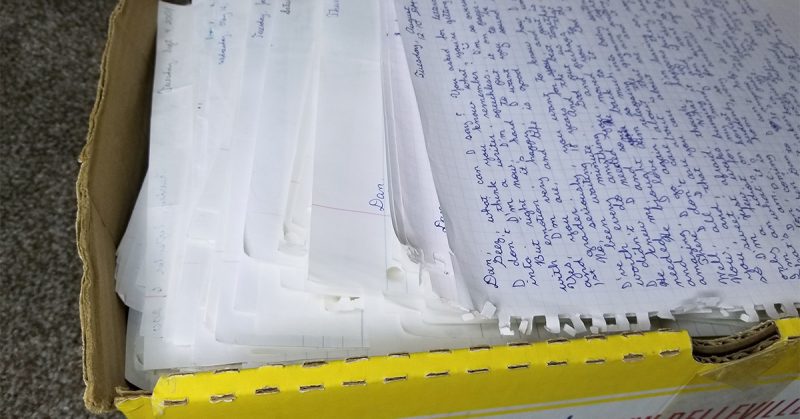My husband and I have an unusual treasure: an old cardboard boot box. It’s bright yellow and originally contained his first pair of military boots. It’s still in our closet now, 18 years later, because it holds something much more precious ‒ our love letters.
We started writing notes as soon as we began dating, even though we saw each other almost every day. Sometimes they were on scraps of paper scribbled during work breaks or pages ripped from my college notebooks. When he joined the military, I wrote regularly during boot camp and his combat deployments. At times, it was the only communication option we had. There are messy, tear-stained letters I wrote describing our newborn son he hadn’t met yet, and I saved his sand-stained letters filled with unusual stories of living in Afghanistan. Letters became our love language. Now, letter writing is considered a dying art. But it can still be an important form of communication for military couples. Here’s how to make letter writing a valuable part of your relationship.
Why should you write letters?
In the modern age of technology and instant messaging, writing letters can feel dated and slow. Why write when you can video chat, text or email? Even during deployments, military families usually have at least some options for keeping in touch with their service member.
After seven years of dating long distance and eventually seven different deployments, my husband and I learned that letter writing has its own value. Words that are written on paper can be saved and enjoyed anytime, even in the desert or across oceans. Although written messages don’t convey all the body language of face-to-face communication, they can be carefully thought out to express your deepest emotions. Seeing your loved one’s handwriting and signature has a very personal touch that can’t be recreated in a text message.
When should you write letters?
Military couples can turn to letter writing to express themselves any time they are separated by distance and aren’t able to make phone calls. A letter can express the mundane details of your day, share a funny story or a joke, or contain plans for the future. Letters can be useful when passing along news or messages from people back home. A note can be inspiring to someone going through a challenging time such as basic training, a military school, or a deployment.
Letters can also be used to discuss deep thoughts or work out big emotions. Long-distance communication doesn’t always allow couples to express themselves intimately. Phone calls and even video chats can feel impersonal if one party is surrounded by friends and coworkers in the background. Quick phone check-ins are not a good time to bring up something that has been weighing on your mind. But a letter can be the perfect way to collect your thoughts, discuss an important decision, and let your loved one know how you feel.

What should you write in a letter?
If you aren’t used to writing, staring at a blank page can feel intimidating. Remember that there is no wrong way to write a letter. If you don’t like how it sounds, you can always tear it up and start over. Think about letter writing as a conversation, similar to the type of chat you would have via text messages if you knew your loved one was sleeping and couldn’t respond right away.
Some people like to approach letter writing like a journal entry. It doesn’t necessarily have to be written to the service member. It can be a collection of your thoughts and ideas, like something you would write in a diary. When you are finished, you can either choose to send it to your loved one or keep it private.
If you want to write a letter but feel stuck, here are some prompts to get you started:
- Describe something interesting/funny/memorable that happened to you today. Tell who was there, what people said, how you felt, etc.
- Write the lyrics to your favorite song or poem.
- Share encouraging or inspirational quotes they might enjoy. You can even copy them from memes or Pinterest if you need ideas.
- Describe a favorite shared memory: a date night, event, fun times with friends, or a holiday tradition. Tell your loved one why that memory is so important to you.
- Ask questions or play a game where you share unusual facts they might not know about you.
- Think about a future goal or dream. Write it down and share it with your loved one.
- Make a list of some of the qualities you love most about your partner.
- Tell them how much you appreciate a recent gesture or conversation with them, and why it meant so much.
You don’t have to be eloquent to write a meaningful letter. Just write what comes to mind, and it will become a treasured token for both you and your service member.





